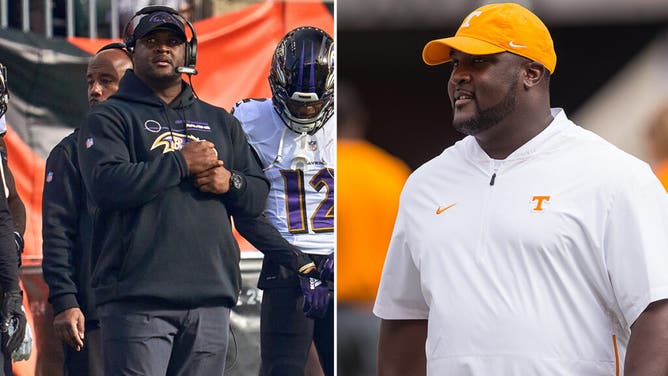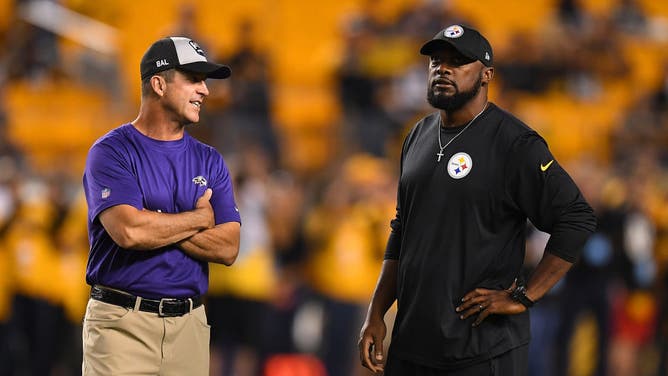College Football Coaches Try To Find Work-Life Balance In New NIL-Portal World, With NFL Jobs Looking Better Every Day
Have the recent changes in college football led to coaches looking for a quicker way to the NFL?
It's certainly been a dream scenario for many coaches to one day be employed at the highest level of football. But more recently we've seen a shift in philosophy when it comes to getting out of the current landscape of college football. These changes have led to coaches either looking for a faster route to the NFL or looking elsewhere or taking a sabbatical from coaching all together.
The new era of NIL and the transfer portal has made the lives of college coaches more strenuous. The past few years have added a new layer to a coach's job title and duties that have nothing to do with coaching and getting young players ready to play. Even though the money is very good at the Power-5 level, the duties that come with the job have changed drastically over the last few years with the portal and NIL, relating to recruiting.
And the result has been watching 19 college football assistants leave for NFL jobs this offseason, including Georgia offensive coordinator Todd Monken (Ravens), Florida WR coach Keary Colbert (Broncos) and Oregon OL coach Adrian Klemm (Patriots). That's in addition to the 18 college coaches who left for the NFL in 2022, which is when the transfer portal and NIL started to become a real factor.
"You can't run from it," one power-five college football assistant told OutKick, "but this certainly wasn't what we thought our jobs would turn into."
The Transfer Portal And NIL Have Changed The Game
The roll-out of the one-time transfer rule in college football played a part in the way coaches have to adapt. Gone are the days of coaches focusing all their attention on high school prospects. Now they can go to the transfer portal and find a veteran from another school. College football programs have staffs built just for the portal itself, with assistants scouring through film of guys that they've heard might transfer.
It was only four years ago that the transfer portal was introduced, but players at the time had to sit-out one year before becoming eligibly at their new school. That changed in April 2021, when players were giving the opportunity to be immediately eligible with the new 'one-time transfer' rule. This rule change was the true catalyst to a new recruiting calendar in college athletics.
A couple months later, in June 2021, the NCAA announced all athletes could start making money off their name, image and likeness. As schools started taking advantage of the new NIL rule, it was the transfer portal that became one of the biggest beneficiaries.
"We're breaking down footage, sitting around the computer and waiting for the next name to hit the portal," one recruiting staffer said. "Then we have to find that player's footage and send it over to the coaching staff, which leads to them having to decide if that player is good enough to make a run at. It's a neverending cycle."
This process adds the next layer to what a college assistant coach is now dealing with in terms of building his position group. One coach might spend one day looking at a high school prospect and the next day on a plane talking to a kid who could most likely contribute immediately. Not every player who transfers is going to get a big sum of money, but they aren't afraid to ask. For some transfers, it's not only about playing time, but also their value to a potential team, which in some cases means NIL money.
"There were some cases where NIL was the first thing brought up in our conversation," one college assistant said. "Not playing time or how the school would benefit him in the longterm. So you get to that point of having players compare what other schools are offering, which should be the first warning sign that maybe this isn't the right situation."
The Differences In College Football Compared To The NFL
Balancing work and being a parent at home always comes with the job in the college ranks. For some coaches, they love the life of being on the road recruiting or staying at the office until the wee hours of the morning. But for a good amount of coaches who have left the college game for the NFL, everyday life now has a balance.
It takes time to adjust, transitioning from college football to the NFL, according to former college assistant Tee Martin, now the Baltimore Ravens quarterbacks coach. Martin spent from 2009 to 2020 as an assistant at various college programs before heading into the NFL in 2021.

Tee Martin, formerly Tennessee's wide receivers coach, now works for the NFL's Baltimore Ravens. (Getty Images)
Martin recalls having to stay on the phone past midnight talking with 17-year-old kids about their everyday lives or why they should go to this school compared to another. The sales pitch never ends, says Martin, and the strain also trickles down to a coach's family life.
"Personally , you have more time with your family, you come to work, you're doing your job, and you go home, because there's not that added aspect of recruiting or traveling during a season, or hosting someone when you have a game or anything," Martin said. "There's nothing that comes between the game and the National Football League.
"I was fortunate enough in my college career to work for guys who believes in having good work-life balance," Martin continued, calling out Joker Phillips, Mike Locksley, Lane Kiffin, Steve Sarkisian and Clay Helton. "We worked just as hard as anyone else. But when the job was over, you went home."
When there is no work-life balance for college football coaches, there is a burnout risk.
"It's about quality of life spent at home with actually being at home and making sure you're at ," Martin said. "You know there were times in Knoxville where I couldn't make it to the game. ...
"Whereas you're done, Friday night, your son plays at 7, you got out of the office early, and you're able to tailgate and get to know people in the community. It matters to us as coaches, the community of it all. Knowing your neighbors and having the time to be in-town to know your own kids, your wife and your family."
Is It Time To Make Changes To The Coaching Calendar?
There's a fair argument to be made that coaches know what they're getting into when they sign a contract. It's obvious that the college game has its benefits as well, especially with the amount of money being thrown around. The coach's life changes once they have to start producing at a high level, obviously. But we're also getting to a point where this is turning into a non-stop job where it's hard to come up for air.
Usually around July is the time that these coaches get a chance for a break, after summer camps are over and there's a recruiting dead period. Leaders of the program will allow these assistants to get away and enjoy life with their family, but it's not as if they can just shut it down. The struggle of not burning out is an issue right now for plenty of coaches around college football. But when is the right time to start worrying about the coach's mental health as well?
"You know, everybody's making rules and changing things for the player. I just feel like over the years, no one has done the same thing for the coaches," Martin said. "Because it's so competitive, everybody wants to win, we all get that. But any kind of high level, very intense job with demands, there's this certain threshold of burnout."

Ravens coach John Harbaugh and Steelers coach Mike Tomlin. (Getty Images)
If there aren't changes made to the lifestyle of the college game, considering the expansion and conference alignment, seeing 19 FBS coaches leave for the NFL will be a small number compared to what could come in the future.
As Tee Martin puts it, the trend could continue if changes aren't made.
"I really do think that collectively, it needs to be examined as, hey, we made it easier for players we've accommodated players, now let's listen to coaches," Martin said. "Let's do something to help accommodate these guys. Because you may continue to see that trend of guys, you know, leaving college going into pro or going to other opportunities."